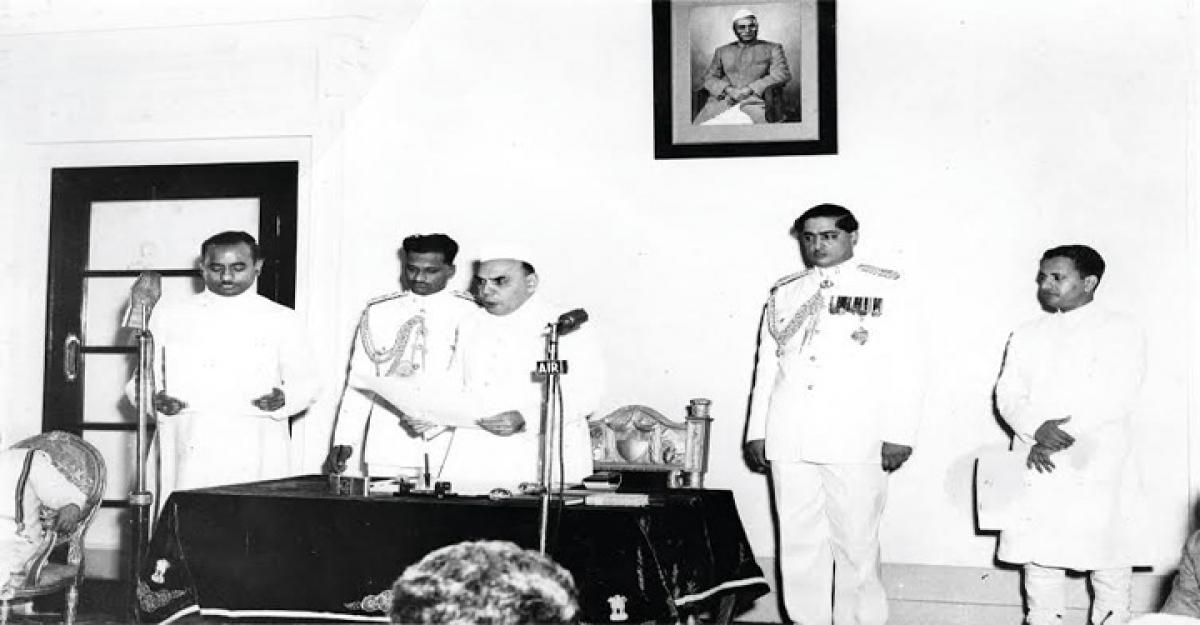Live
- NTR should be awarded Bharat Ratna, says CM
- Vizag mafia rules sand ramps in Srikakulam district
- Unselfishness is a Lie
- ICTPL welcomes maiden vessel MV KSL Fuyang
- BJP leaders mock Rahul's speech
- Analysing Happiness
- Two-day ToT organised for trainers
- Savarkar preferred Manusmriti to Constitution: Rahul
- Daily Horoscope for 15 December 2024: Embrace Today’s Insights of Your Zodiac Sign and Unlock Your Potential.
- Beyond The Flames
Just In

JV, a gentleman to the core. Joginapally Venkata Narsing Rao also popularly known as JV Saheb was one among a very few politicians who lived life eminently with an unflinching devotion to humanistic values and with the motto of ‘service above self’.
J v Narsing Rao birth centenary fete today
- He lived a life with the motto of ‘service above self’
- As a lawyer, he held judges spellbound with his thorough preparedness and persuasive approach
- He was a highly committed Congress leader
Hyderabad: Joginapally Venkata Narsing Rao also popularly known as JV Saheb was one among a very few politicians who lived life eminently with an unflinching devotion to humanistic values and with the motto of ‘service above self’. Born into a family of landlords on October 14, 1914 to Gopal Rao and Lokamma couple at a time when the First World War was on and the country was witnessing a rising crescendo of patriotic fervour, JV was destined to achieve heights of success.
He was born at his maternal grandfather’s village of Kurkiyal in Karimnagar district and grew up at his native villages of Dwaraka and Dharmaraopeta located in Luxettipet taluq of Adilabad district. JV was married when he was 18 years and his wife Radha Devi was 12 years old. Radha was the daughter of Jagga Rao of Gatla Narsingapur village of Huzurabad taluq in Karimnagar district. JV encouraged his wife to complete her schooling and college. All his children are highly educated. 
JV’s penchant for higher education drove him to Aligarh Muslim University and Banaras Hindu University from where he obtained BA, MA and LLB degrees. This period of college-going must have instilled secular fervor and cosmopolitan outlook. As a lawyer, his thoroughness of preparation and persuasive approach often left the judges spellbound. After 16 years of successful practice, he made his forayed into politics and remained loyal to his mentor KV Ranga Reddy until the formation of AP.
Later, he was equally loyal first to Neelam Sanjeeva Reddy and later to Kasu Brahmananda Reddy. At 40, relatively young age for a politician; JV became the Hyderabad Pradesh Congress president facing heavy odds and the might of the then chief minister of Hyderabad State Boorgula Ramakrishna Rao, who supported the candidature of Mallappa Kollur. Then there was an offer for JV of being elevated him to the post of High Court Judge if he paved way for the unanimous election of Mallappa.
But the determined JV, who then had the backing of KV Ranga Reddy and Marri Chenna Reddy, went on to win the election. JV’s statement after the win - “The election had clearly indicated that I had the confidence of the majority of the delegates, yet I will do my best to gain the confidence of all members of Pradesh Congress.” – personified his commitment to the party.
His untiring efforts to strengthen the Congress Party proved fruitful within 100 days of his assumption of office as president of Hyderabad Pradesh Congress when the party fared spectacularly well in the Hyderabad Municipal Corporation elections. The courage and sagacity showed by JV during the merger of Hyderabad state with the Andhra came to fore when he impressed upon the Union Home Minister Govind Vallabh Pant with his argument in getting more powers to Telangana regional committee to safeguard the interests of the region.
JV was among Hyderabad chief minister Boorgula Ramakrishna Rao, Andhra CM Bezwada Gopal Reddy, N Sanjeeva Reddy, Gouthu Latchanna, Andhra PCC president Alluri Satyanarayana Raju, KV Ranga Reddy and Marri Chenna Reddy who signed the ‘Gentlemen’s Agreement’. JV who played a crucial role in N Sanjeeva Reddy’s election as the leader of the Legislature Party had found a place in the first Cabinet after the formation of AP State. He was given the portfolio of Irrigation and Power.
He then represented Begum Bazar constituency. Later, he served as the Chairman of the State Electricity Board and his efforts saw AP stand first in rural electrification in the country. Kadem project, which completed in 1957 bringing 65,000 acres under irrigation, is one among many development works JV contributed to his native district Adilabad.
Even when there was uproar that hegemonic Andhra leadership was violating the Gentlemen’s Agreement, which alone paved way for merger of Telangana with Andhra, JV’s support to integrated state of Andhra Pradesh appeared mystifying to many. However, it was his belief perhaps that Channa Reddy was exploiting the Telangana sentiment only for his political interests with the Congress Party.
To lessen the impact of the agitation demanding the implementation of Telangana safeguards and restore the normalcy, the then Chief Minister Kasu Brahmananda Reddy resigned from his post. However, following the Congress Legislature Party’s resolution, Reddy reconstituted his ministry and made JV the deputy chief minister.
After he was elected from Luxettipet constituency in 1972, JV did not get any prominence in the government or in the party affairs. A few days after JV received feelers from the then Prime Minister Indira Gandhi to play better role in the functioning of the party, he died on September 3, 1972 after he underwent nasal surgery to get over the problem of sinusitis bringing the curtains down to an illustrious life.
By Adepu Mahender

© 2024 Hyderabad Media House Limited/The Hans India. All rights reserved. Powered by hocalwire.com







